6th Circuit Rules Tire Marking Unconstitutional
A Federal appeals court says the traditional means of parking enforcement violates the 4th Amendment.
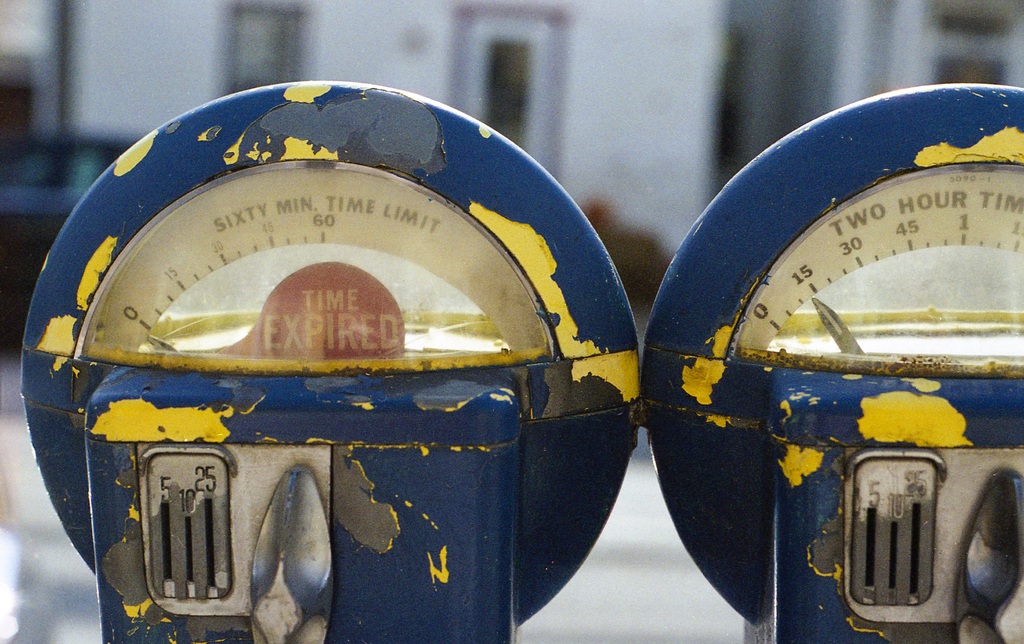
They say you can’t fight city hall. But a woman took an incredibly novel argument to court and managed to strike down the procedure by which jurisdictions across the country enforce parking limits.
Marking tires to enforce parking rules is like entering property without a search warrant, a federal court said Monday as it declared the practice unconstitutional in Michigan and three other states.
Alison Taylor had received more than a dozen $15 tickets for exceeding the two-hour parking limit in Saginaw. The city marks tires with chalk to keep track of how long a vehicle is parked. Her lawyer argued that a parking patrol officer violated the Fourth Amendment right against unreasonable searches.
A three-judge panel of the appeals court agreed.
The purpose of marking tires was to “raise revenue,” not to protect the public against a safety risk, the 6th U.S. Circuit Court of Appeals said.
“The city does not demonstrate, in law or logic, that the need to deter drivers from exceeding the time permitted for parking — before they have even done so — is sufficient to justify a warrantless search under the community caretaker rationale,” the court said.
The decision sets a new standard for Michigan, Ohio, Kentucky and Tennessee, the states covered by the 6th Circuit. The court overturned an opinion by U.S. District Judge Thomas Ludington, who had called the legal theory “unorthodox” and dismissed the case in favor of Saginaw.[…]
[Taylor’s attorney, Philip Ellison ] argued that marking tires was similar to police secretly putting a GPS device on a vehicle without a proper warrant, which was the subject of a 2012 U.S. Supreme Court ruling.
“We don’t think everyone deserves free parking,” Ellison told The Associated Press. “But the process Saginaw selected is unconstitutional. … I’m very glad the three judges who got this case took it seriously. It affects so many people.”
The case will return to federal court in Bay City. Ellison wants Ludington to certify the lawsuit as a class-action, with refunds for people who got tickets. He said Saginaw has been collecting up to $200,000 a year with parking tickets from tire marking.
— AP, “Court: Marking tires for parking enforcement is unconstitutional”
I must say, I find the ruling baffling in a number of ways.
I’m a big believer in the 4th Amendment and think the Supreme Court has whittled it to nothingness in many instances by declaring that people have little to no expectation of privacy outside their homes. SCOTUS got it right in the GPS case referenced as precedent above, which Doug Mataconis analyzed in depth at the time.
But how is marking a tire with chalk a “search,” much less an unreasonable one? That the vehicle is parked in plain sight along a curb is not private information. The chalk does no damage to the tire. Its literal only purpose is to establish that the vehicle was parked at a given time when the enforcement official passed by for checking against a subsequent time. That’s no more a “search” than checking to see if the parking meter has expired.
That “the purpose of marking tires was to ‘raise revenue,’ not to protect the public against a safety risk” is doubtless true. But, in addition to revenue, municipalities have an interest in keeping people from occupying valuable parking spaces near downtown merchants, courthouses, and the like for extended periods. That’s hardly an overreach in power.
UPDATE: I’ve scanned the actual opinion in the case and have not altered my view. The rationale that touching the tires of a car parked in a public street constitutes some sort of invasion of privacy is simply absurd.

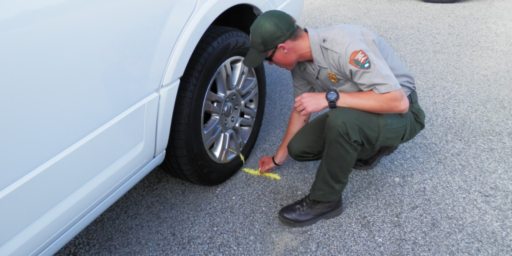
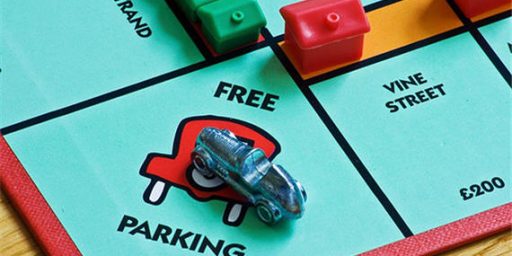
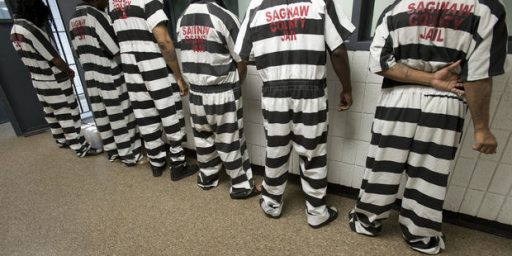
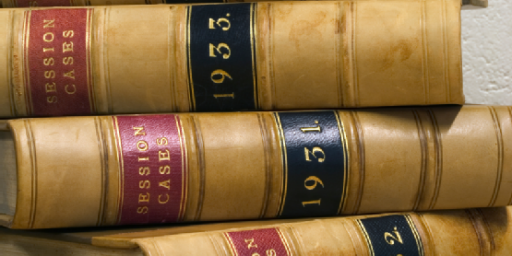
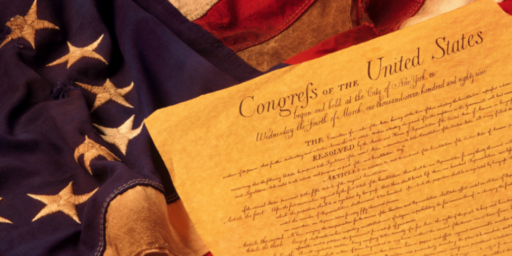
VIN numbers encoded in RFID stickers is the next logical step. Then municipalities could just establish rate zones and bill you at the end of the month for the time you spent parked in the zone. 25c per hour per car and no salaried ticketing employees would be better all-around.
Without having read the case, I’m going to guess that it’s the physical contact that distinguishes chalking from the passive observations you’re comparing it to. Granted, it’s a silly case to have brought in the first place, but I’m inclined to agree with the principle that physically marking a person’s private property presents a 4th Amendment issue and should be subject to the reasonableness standard therein. I’d probably have ruled that it meets that standard since it’s such a minimal invasion and serves a valid governmental purpose, but that’s different than saying it doesn’t even implicate the 4th Amendment.
Chalk is just a low-tech GPS…tracking where you are NOT going.
I’m no more comfortable with this than I am cameras and remote radar to ticket drivers.
I’m no more comfortable with this than I would be if the Govt was using information from toll booths to track your speed.
If a town wants to maximize revenue put in meters.
Parking fines are infuriating. I’ve had two. Most recently last week, for using two spaces, which were not marked clearly, not to mention the whole street was empty.
The fine itself is bad enough, but in Mexico City they also immobilize your car by locking a metal contraption to the front left tire. You need to pay the fine at a bank or a convenience store (cash only, about $35 US), then you need to call to get them to remove the damned thing.
I’d be interested in hearing more about the three judges on the panel. This seems to fly in the face of common sense and more importantly seems to be imposing by fiat the standard that parking fines are only justified if they insure public safety, not for ensuring businesses have spaces available, residents can park outside their homes, or even for the express purpose of raising revenue.
My guess is that these judges are Federalist Society cranks, obsessed with the Deep State, Takings and other billionaire hobbyist pet peeves. But I might certainly be wrong. I’m willing to bet a cheap beer on it rather than, say, a good scotch. Any takers?
@MarkedMan:
I’d have guessed No since Federalist Society types seem to take a narrow view of the 4th.
I actually looked up the case and the opinion was written by BERNICE BOUIE DONALD, a 67-year-old African-American woman who was appointed to the bench by Bill Clinton and elevated to her current post by Barack Obama. So, no, not a Federalist Society type.
@MarkedMan: @James Joyner:
Concurring Judge Keith was appointed to the 6th Circuit by Carter; Judge Kethledge by George W. Bush.
I think you guessed wrong.
@R.Dave:
Your guess is correct. From page five of the opinion:
The 4th Amendment not only protects against unreasonable searches but unreasonable seizures as well. It was this second right which the court found was violated.
What are you doin’ there fella’?
Cool Hand Luke
@James Joyner: I owe someone a cheap beer. Who will collect on an icy cold PBR?
So let me get this straight… If it’s one of those parking systems where you pay at a kiosk near the parking space, then put the ticket you are issued on your dashboard, and the police come by and read that ticket that is inside your car by looking through your windshield, and issue you a ticket because you have been there too long… that’s all perfectly fine. (No pun intended.)
But if instead of peering into the interior of your personal property they simply put a water-soluble temporary mark on a tire… that’s an illegal search?
Have I got that right? That the key is that they needed to force you to mark your own vehicle, rather than them doing it for you?
@Not a Thomas Cooley grad.:
But nothing is being seized here. The officer put a chalk mark on a parked car. In what way would that constitute a seizure?
Activist Judges!
Let me also say that I am not particularly sympathetic to ‘privacy’ arguments applied to people who are operating publicly licensed vehicles on publicly provided infrastructure. If you wish to obtain a license to drive and park a car on public roads, you should expect the government to regulate how you do that, which involves watching you do it.
Yes, you have privacy rights that apply to the contents of the trunk and the glove compartment. Not so much for the exterior of the car, or anything related to complying with the terms of your license.
@DrDaveT:
Or the case I forgot earlier — if instead of marking your tire, they simply have a smart TV system that watches the parking spaces, and records the time stamp of when each car arrives, and sends an alert to the parking enforcement office when a car overstays its time…? Illegal search?
@James Joyner:
A seizure doesn’t neccessarly involve a taking away or even sequestration although that’s what we usually consider it to be. It can be anything which restricts movement or interferes with a persons use or enjoyment of property. A trespass is a type of an unlawful seizure which the court discusses in its opinion.
@DrDaveT: stuff in sight is different from anything that involves marking.
@Grumpy realist:
Then it isn’t a privacy argument, and it isn’t an illegal search argument. The argument must be that putting a chalk mark on a tire somehow constitutes a ‘seizure’ of the vehicle, for the instant required to apply the mark. Which seems… wrong.
I could see a reasonable argument that it was state sponsored vandalism, or a first amendment issue with forced speech (“I’ve been parked here since the last time you drove by marking tires”) or self-incrimination, but the search argument is a huge stretch.
Also, if this is upheld on appeal, the obvious answer is going to be cameras watching the street, recording license plates and when people park, which is a greater loss of privacy.
However, if they have a “Dude, Where’s Your Car?” app, I might find that helpful.
Really? I can see “I disagree with this ruling”. But BAFFLED by it?
@DrDaveT: From that perspective, the first scenario represents a contract to provide parking for a fee, ostensibly granting the right for the contractor (?) to look through the window for verification of contract terms.
@The abyss that is the soul of cracker:
But you can’t have a contract to provide parking for a fee, granting the contractor the right to put a chalk mark on your tire? Or you can only grant that right if the contractor isn’t the city/state/federal government?? Once you go the “it’s a contract” route, there’s no longer any basis for distinguishing chalk marks from tickets on the dashboard or any other mechanism agreed to by the parties.
Would the Court have ruled differently if the use of chalk marks were clearly stated on the “2 hour parking” sign?
@Gustopher:
FWIW, iPhones already have this and I assume Android phones do too. It senses that you were moving at car rates of speeds on public roads, and that you then stopped and proceeded at walking rates. It assumes you parked your car at that location and marks it. (Hmmm, not sure, but I guess it would also mark the location where a taxi dropped you?). In any case it shows my car parked roughly in my garage right now.
What I would like is for my key fob to record whether I locked my car and closed all the windows.
So some scofflaw woman with a bunch of parking tickets paid enough money to her lawyers to successfully challenge a practice that has been accepted for decades? a hundred years? Along with anti-vaxxers and the election of Trumpsky, another example of the dumbing down of the nation
@Stormy Dragon:
Most appellate court opinions are on topics where there’s at least a reasonable argument to be made. I disagree with rulings all the time but the rationale for them is at least 40% persuasive. That is, if you read the rationale, you can see why they arrived where they did. This one is just baffling.
If, say, the question where whether the state could boot one’s car—making it impossible to drive and thus leading to all manner of externalities—over a parking ticket, I could very well understand a ruling on either side of that question. Yes, it’s a common practice. But, yes, it’s arguably an unreasonable seizure.
A chalk mark? Uh, no.
@James Joyner: The court in this decision did not hold that the chalk mark was a seizure. I’m not sure where you’re getting that.
They determined a search had occurred because the act of physically placing a mark on the vehicle (tires are part of the vehicle) to gain information (how long it had been parked there) satisfied the criteria for search laid out by SCOTUS in U. S. v. Jones (2012). They then determined that since the search was warrantless, the city needed to justify an exception to the 4th Amendment’s warrant requirement, but the city did not do so:
To echo Stormy Dragon, I can see disagreeing with the ruling, but it’s far from baffling. The city didn’t support its position to the court’s satisfaction.
I would suggest the parking enforcement employees be equipped with cameras and simply take close-up pictures of the sidewall markings on the tire. The time stamp and tire position would be captured for posterity and no 4th amendment issue.
When I was young we used the tires to mark the roads – burning rubber!
’63 Chevy Impala SS two – four barrel Holley carb, four speed Muncie trans, 327 cubic inches
So it was the act of touching the car which the judges deemed a violation? Then what about placing a ticket under the windshield wiper?
The comparison with GPS tracking devices seems absurd. The tracker obtains private information about the travels of the car and presumably its owner, but the chalk mark does not obtain, or make known, any private information of the car and owner. The fact that the car has been parked in a public spot for a couple of hours is in no way private information.
While I oppose the weakening of our rights by government overreach, I believe the judges were wrong this time.